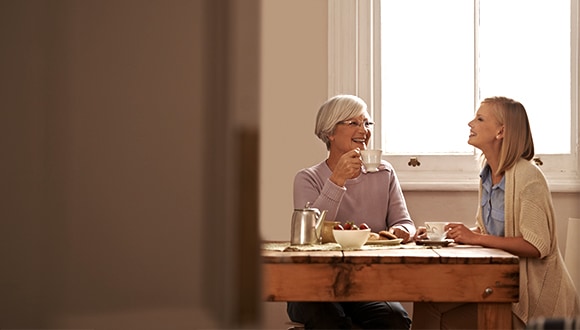Can technology help older people stay in their homes for longer?
Melbourne-based brothers are reimagining the way aged care is provided in Australia.
Health Agenda magazine
April 2018
A digital monitoring system called Billy is helping older people stay in their homes for longer. Founded by Melbourne-based brothers Tim and Matt McDougall, Billy was a start-up participant in the 2017 HCF Catalyst health tech accelerator program.

Keeping seniors’ support networks informed
Billy relies on small sensors distributed around the senior’s home to pick up activity. The sensors track temperature, movement and the opening and closing of doors, so you can tell if your loved one has gone through their usual routine of getting up for the day, prepared meals, taken medication and arrived home safely after going out.
That information is shared to an app for a nominated family member, friend or caregiver. This helps seniors receive the right support when they need it.
The pair came up with the system in response to their grandfather’s needs. Their fiercely independent grandfather wanted to stay in his own home for as long as possible, despite his remote location and dementia diagnosis. Concerned for his wellbeing and safety, his family looked for digital solutions.
“You can get an emergency button that calls an ambulance. You can get a device that detects that somebody has had a fall. However, there wasn’t anything that focused on helping someone maintain their wellbeing and their independence,” Tim says.
Protecting privacy and dignity
Instead of relying on the older person to check in, the sensors do all the work discreetly in the background.
“Making it passive is about protecting dignity – the senior isn’t asked to wear anything or push a button and they can get about their normal lives without interference,” Tim explains.
This also improves the system’s reliability as it’s not reliant on someone remembering to wear a device or to get in touch.
“We don’t do anything like cameras in the home – we think that crosses the line in terms of privacy and dignity.
“In our grandfather’s case, we knew that he was suffering from dementia, but we knew that if he’d got up for the day and had his morning cup of tea we were reassured that things were okay.”
Complementing family interaction
Billy isn’t designed to replace family contact, but to inform and assist it, McDougall says. Far from replacing personal interactions, it can increase engagement between families and seniors.
It can also support physical health through tracking if medication has been taken and alerting families of a problem early, for example if there hasn’t been movement detected for a few hours.
“We really are trying to reimagine the way that aged care is provided in Australia, and ensuring that older people feel safe, comfortable and have peace of mind is fundamental to supporting their mental health.”
Related articles
MEMORY LOSS OR DEMENTIA: HOW TO TELL THE DIFFERENCE
As we age, our focus, ability to retain new information and memory may diminish, but dementia goes much further. Here’s what you need to know.
THE HEALTH IMPACTS OF LONELINESS
For many of us the world is becoming a lonelier place. More than just making us feel sad, it can make us physically ill, but there are ways to reach out.
THE TELOMERE REVOLUTION
The tiny telomeres on our DNA may hold the key to living longer, ageing better and staying healthier. But can we improve our telomere health?